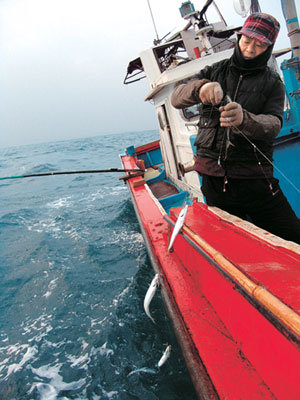Travelers Delight: Wild Mackerel
Travelers Delight: Wild Mackerel
Posted February. 03, 2006 03:04,

There are many names for mackerel. But no matter what you call it, the fish is gaining popularity with the recent discovery of its unsaturated fatty acids, also known as EPA, and its brain-boosting DHA components.
The barley of the sea, which mackerel is sometimes called, bursts with nutrients year round. So why the sudden introduction to the mackerel of the wintry Jeju sea? Raw fish, of course. These days, you can go fishing in Jeju Island for palm-sized mackerels destined for raw fish dishes that cost only 20,000 to 30,000 won. Because of the slack season, you wont even have to face crowds.
Mackerel raised in captivity are just wild fish that have been fattened in nets. These luscious fish cost a pretty penny retail.
These mackerel make it hard for the fishermen on Jeju Island, complains Kim Seong-taek as he makes his way to a restaurant to deliver live mackerel from western Jeju City every morning at dawn. According to Kim, all Jeju raw mackerel dishes are prepared with completely wild mackerel.
To see how Jeju Island mackerels are caught, we boarded a 4.66-ton boat at 6:00 a.m. At daybreak, the boat dropped anchor after passing through the Jeju port bulwark. Twenty needles were inserted into four levers on a huge fishing pole, which was lowered into 80-meter-deep water for thirty minutes. As the pole began to rise, mackerel after mackerel followed.
The captain threw the fish into a seawater basin in the boat and lowered the pole again. The cycle repeated itself in other fishing areas for about two-and-a-half hours. The catch could have gone on for longer, but the fishing is over soon. The fish are only good while theyre fresh. Live fish account for 55 kilograms out of every 100 kilograms of fish caught. The rest die in transit.
On the way back, the captain chooses some feisty mackerels and gets ready for a snack. A flash of knives and mackerel chunks disappear into hot sauce, and then into mouths, where the chewy meat tickles taste buds. Dead mackerel doesnt taste like this. The meat gets mushy, he says.
After docking, we head to a raw fish restaurant that is property of the ship owner. These small ones here are for sliced raw fish. Big ones go to those restaurants over there for pot stew. They are tastier with cabbage.
He hands us some raw mackerel. But it tastes different, which is where the sauce comes in. Diced garlic, red pepper powder, and a splash of vinegar make the dish come to life.
Travel Information-
Tasty mackerel can be found at Suseongs Raw Fish Place (064-702-0442. 011-692-3934), where you can get mackerels on ice for 5,000 won per kilogram. Other fish are available.
Domestic Duty-Free is a store located at Jeju Airport and Jeju Harbor 1 and 2, Seongsanpo Harbor, offering nearly 4,000 products such as cigarettes, alcohol, cosmetics, handbags, and other goods from a range of about 170 brands.
Dogs are a mans best friend at Jazz Village (www.jazzvillage.co.kr), where kids can run and play with four American cocker spaniels on the grassy yard of a resort-styled log structure. Seoul-Jeju round-trip fare is 99,000 won for two nights, and 89,000 won for three. The outdoor barbeque is free. Offer good until March 24. Call 064-738-9300 for more information.
You can also enjoy a snow-capped package with your airfare: 165,000 won for two nights accommodations and a rental car for three days, airfare included. Visit Daejangjung Tours (www.djj.co.kr) or call 064-711-8277 for more information.
Seung-Ha Cho summer@donga.com




![“잠만 자면 입이 바싹바싹”…잠들기 전에 이것 체크해야 [알쓸톡]](https://dimg.donga.com/c/138/175/90/1/wps/NEWS/IMAGE/2026/02/23/133404749.3.jpg)

![[단독]“학업 위해 닷새전 이사왔는데”…‘은마’ 화재에 10대 딸 참변](https://dimg.donga.com/c/138/175/90/1/wps/NEWS/IMAGE/2026/02/24/133414074.1.jpg)
